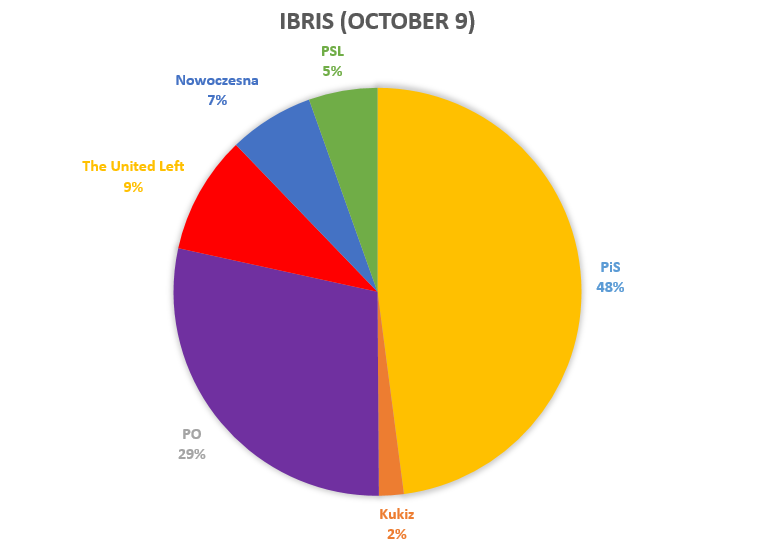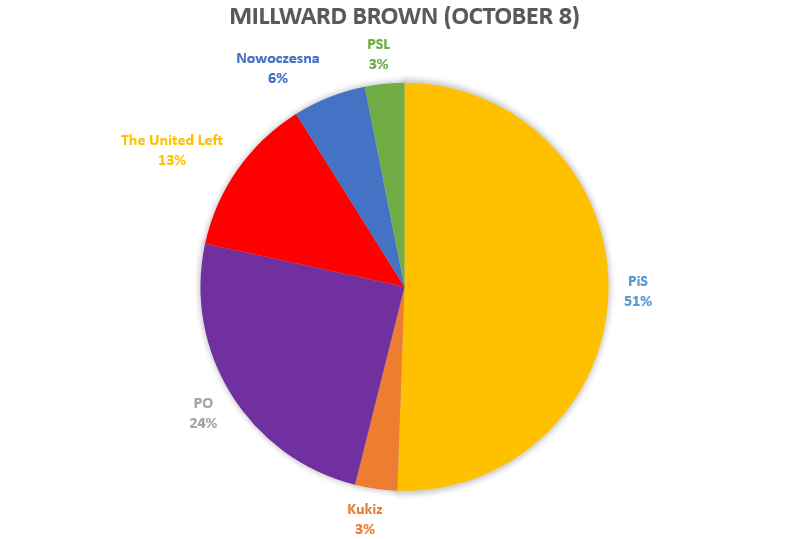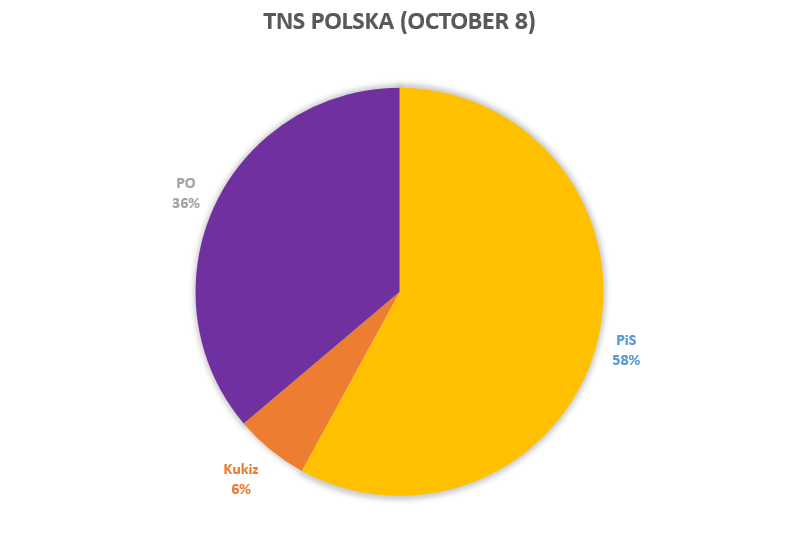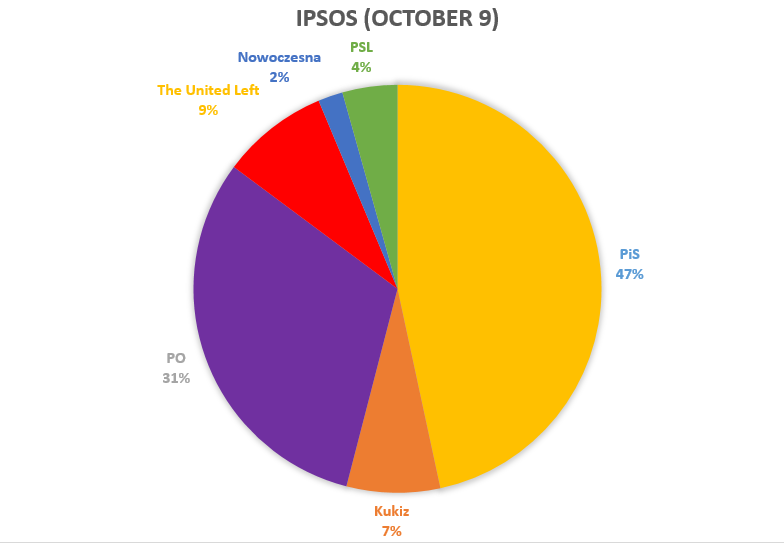An Anti-PiS Grand Coalition?
A provocative argument has been appearing with increasing frequency on the left and center-left in Poland, claiming that a victory by the radical-right Law and Justice party (PiS) in the upcoming elections would actually be preferable to the continued rule of the center-right Civic Platform (PO). Two variants of this assertion have appeared in the last few days. On October 12 Jan Śpiewak posted this critique of Civic Platform on Krytyka Polityczna’s website. After enumerating the many errors and missed opportunities of the past years, he concluded,
Worse, however, than the Kopacz-Piechociński government would be a Kopacz-Piechociński-Miller-Petru government. The program of such a government will be an even smaller state, even lower taxes, even worse working conditions. If Civic Platform remains in power, it will not carry out the necessary changes and the emerging alliance with two neoliberals can only deepen the peripheral status of the country.
Śpiewak is referring here to the leaders of the parties that might form an anti-PiS coalition. Ewa Kopacz is the current Prime Minister and the head of PO; Janusz Piechociński is the leader of the agrarian Polish People’s Party (PSL), which is currently in a coalition with PO. The other two figures are Leszek Miller, who heads the United Left (a recently-formed alliance of leftist organizations), and Ryszard Petru is an economist and banker who leads a new libertarian party. We can safely assume that the final viable party, the ultra-nationalists behind Paweł Kukiz and his eponymous Kukiz15, will join with PiS. Of the four most recent polls, three suggest that a PiS-Kukiz15 coalition will win the necessary votes to form a government. But one survey from recent days (and several others if we stretch back a week or so) show the possibility that PiS and Kukiz15 will fall just a few delegates short of a majority (see the graphs below).
This leaves the door open to the sort of awkward coalition that Śpiewak has denounced. He fears that such a government would be doubly flawed. On the one hand, he assumes that “neoliberal” voices would dominate despite the presence of the United Left and PSL, and that the resulting policies would bring to Poland the sort of austerity economics that has left so much ruin elsewhere in Europe. This might be a realistic expectation, because PSL has proven to be supremely pragmatic and ideologically flexible, while most of the leaders of the United Left have (at best) very weak social democratic bona fides. But an even greater concern for Śpiewak is that PO would learn nothing from this experience. Better that the party have a few years in the wilderness of parliamentary opposition, because that would give the party a sharper ideological backbone and make it more responsive to all the social issues it has ignored during these past eight years in power.
A different critique of the grand coalition idea came from Jarosław Kurski, in an editorial from October 7 in Gazeta Wyborcza. He argues that it would be a perversion of democracy to deny PiS the chance to govern, given that it is clearly the most popular party in Poland today. True, it is far from a majority (with approximately 35% support), but that’s at least ten percentage points more than PO has at the moment. If all the anti-PiS parties join together to keep PiS from power, many voters will interpret this as a sign that the system is rigged and that some nebulous group of “elites” is once again using parliamentary tricks to silence the voice of the people. That would push even more people towards radical ideological alternatives, and probably strengthen PiS’s base considerably. Meanwhile, a grand coalition will inevitably be weak and unlikely to achieve much, setting the stage for an electoral disaster later. Right now it is unlikely that PiS will gain the 2/3 majority that it would need to change the constitution, so whatever damage it might do would be limited. The leaders of PiS have demonstrated repeatedly, Kurski argues, that they are incompetent and demagogic, and without the ability to change the constitution to fortify their hold on power, their government would fall after a few years and the far right would be discredited for many years to come. After all, this is what happened in 2005-2007, setting the stage for the most stable and productive eight years in recent Polish history.
Arguments like these are quite persuasive, though they are both grounded in a risky optimism. A few years of PiS rule would be frustrating and damaging, but it is unlikely to lead to long-term harm. And as Śpiewak has argued, the policy proposals advanced during this election campaign (carelessly planned though they might be) would entail a shift from austerity towards a more stimulative approach. But what if these authors are underestimating the political skill of Jarosław Kaczyński? What if he has learned a few lessons since his last time in power, and is ready now to take the steps needed to hold on to power? Viktor Orbán and Vladimir Putin have shown how easy it is to transform a weak system of parliamentary democracy into a dictatorship with the use of nationalist demagoguery and anti-liberal sloganeering. Poles would like to think that their country is no longer vulnerable to the siren song of authoritarian populism, and they might be right. Perhaps the institutions of Poland’s political structure are strong enough to withstand a few years of PiS control. But nothing in the recent history of that party suggests that it respects the niceties of parliamentary procedures, and Kaczyński’s rhetoric has long been grounded in a conspiratorial worldview in which the pursuit of national unity and strength takes precedence over “technicalities” like judicial norms, press freedoms, or parliamentary rules. He firmly believes that his brother, former president Lech Kaczyński, was murdered by a plot organized by his domestic political opponents and nefarious foreign powers. A person who thinks that this is how the political world functions is not likely to be constrained by democratic standards or ethical inhibitions when he has the chance to rule. “Do unto others as you would have them do unto you” can turn into a dangerous principle for someone who believes that others have been murdering and oppressing his supporters.
Slovakia lost much of the 1990s to the misrule of Vladimír Mečiar, and it eventually took a grand coalition of awkward allies to push him off the political stage. Viktor Orbán has taken Hungary even further down the dark path of nationalist authoritarianism, and it’s hard to see now how he will ever be removed. Very little stands now between Poland and that fate. An ideologically incoherent anti-PiS coalition would provide a very poor government for the country, and if the alternative is a couple years of chaos then the latter might be the inoculation needed to prevent deeper disasters. But what if the alternative is an indefinite far-right regime in Warsaw? It is impossible to know right now which of these paths is most likely, but decisions made over the next few weeks could have consequences for decades to come. 


